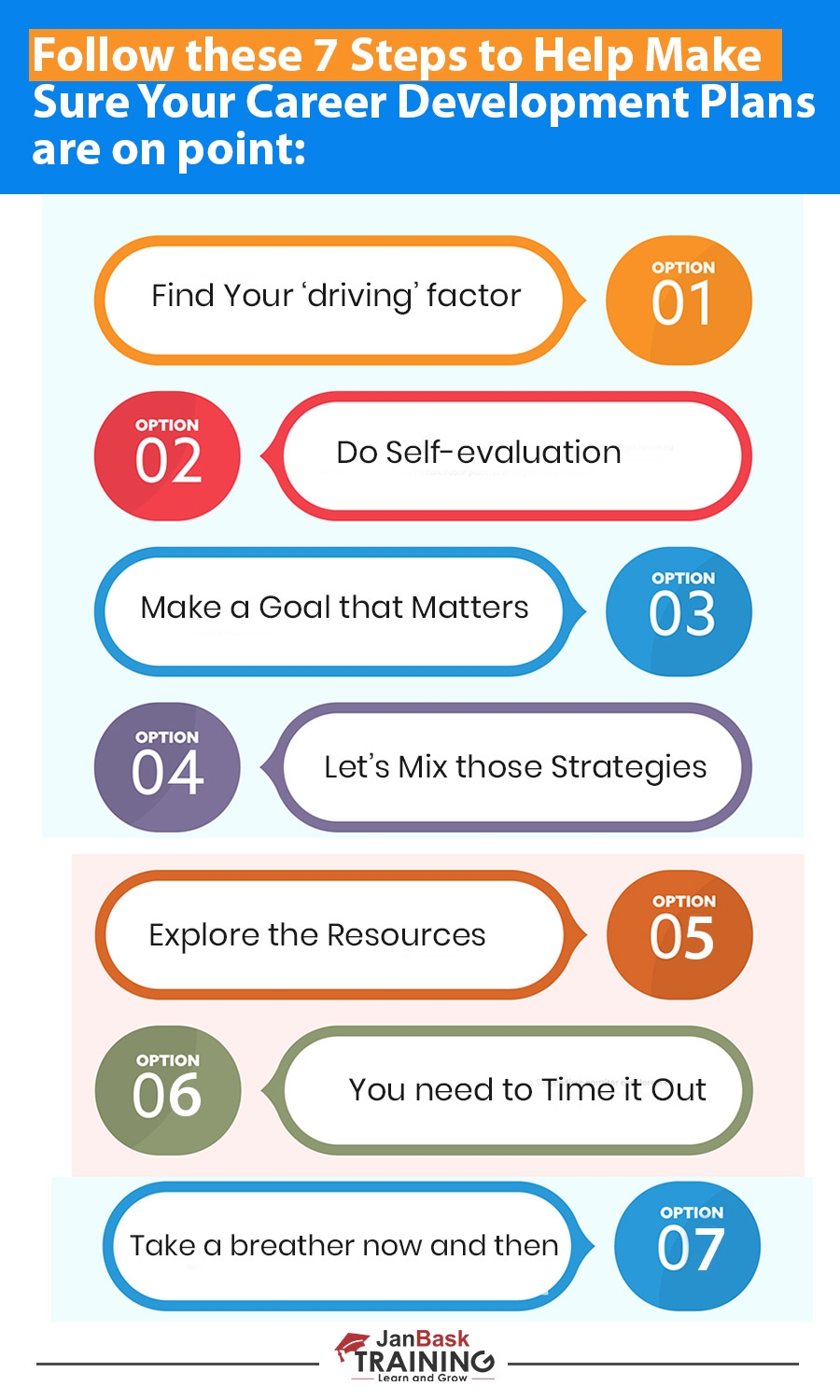7 Steps to Create Career Development Plan for Professional Career Success
Introduction

This quote by Napoleon Hill highlights not only the significance of having a goal in life, be it personal or professional but also the desire to achieve it, come what may.
Do you’ve such a purpose? Some goal that you’ve set for yourself?
No, I’m not talking about the New Year Resolutions that we all put all our energy and efforts into selecting that we would like to achieve over the year.
We both know we forget them by the end of the first week of January. I’m talking about goals that some of us hope to achieve in the future. For us, this may include some long-term career goal or dream job that they would like to obtain. These are called professional career development goals and a career development plan is what makes it possible for us to get it.

This blog will help you in understanding:
- Why should you have a professional career development plan?
- How a working professional can create a professional career development plan that works.
- 7 Steps to create a career development plan Professional
How to live life like Jeff Bezos? Career Development Plan is YOUR answer

When you think of someone like Jeff Bezos, what do you think about? Chances are, you think about where he is now along with the list of achievements he possesses and the wealth. But the real question should be how did he reach where he is today. What did he do to achieve success? Jeff Bezos’ worth is more than $90 billion. His brand Amazon started as a meager online bookselling store and now is this wildly popular e-commerce giant that is into everything, be it cloud computing, digital streaming, and even artificial intelligence.
But Bezos hasn’t always been this successful billionaire titan that he is today. He was born in a very humble background, however, what worked for him was that he worked his way up with commitment, a desire to win, and a plan.
Bezos might not have thought he would someday become the CEO of an e-commerce juggernaut, but he clearly had the desire to succeed in his endeavor. Meaning he had set some career goals and worked towards them consistently.
This should be your approach to your career as well. After all, no one is going to come in with a magic wand to give you your dream job or tell you how to achieve a leadership role at your current company. You have to build a career development plan for yourself and follow it diligently. This is your key to success.
When you know how to create a growth plan for your career, you’re able to do what your heroes once did: use your resources to their fullest potential to create success.

So, now we know the importance of a career development plan, how do we create successful professional development as a working professional?
Career Development Plan Drive Professional Career Growth and Help You Love What You Do
Everyone seeks career growth and development while looking for jobs. One way to achieve career growth is that you can change jobs every few years. However, there's still a long period of time between not growing or upscaling your skills once you settle into a job and the time you decide to move onto the next one.
Having said that, it doesn’t mean you should stop seeking to gain more skills or achieve career success. But the road to reach your professional goals should consist of a series of steps that you need to go through systematically. We recommend that you try these tips to help you make more progress on your professional growth before you eventually decide to move onto the next job:
- Put your career growth on the fifth gear from the start
Start by asking your company about what they do to invest in their people’s career growth during the interview process. You can also reach out to a future colleague and ask them how the company has helped them grow and decide the job based on this to always remain on top.
- It’s all about the steps. Small but actionable steps
Divide your goals into small steps as dividing them makes it easier to focus and you can reevaluate yourself from time to time. Suppose you want a leadership role in the company so Instead of directly wanting a leadership role in the company, define it to its last detail.
- Ask yourself what skills do you possess that make you a better leader?
- What are the barriers, personal, and professional that you might face in your journey?
- What skills or experience you need to acquire before you can achieve your goal?
Write all your answers in a paper as knowing what your target makes it easier to aim better and guarantees smooth career growth.
- Manager to the rescue or support
If your manager is someone who takes interest in your growth and motivates you, congratulations. You’ve got an amazing manager. To help create the best steps for career development, ask your manager questions like:
- What skills do I possess?
- Do I have your endorsement based on my experience or expertise?
- What are the criteria for promotion I need to work on?
- How can I gain the required experience or skills?
Once you have answers to these questions, you can then tick them off one by one as they lead you towards your incremental progress.
- If you don’t have the back of your manager, you’ve not hit a dead end
The work you put in will still pay off; if you do these things, they’ll enable you to get great job opportunities. It will also help you see gaps in your profile, and you can always work on them as the situation demands.
Great Careers Don’t Happen By Accident. They do it by a Great Career Development Plan
7 steps to help make sure your career development plans are on point
1. Find Your ‘Driving’ Factor
- What separates ordinary people from great leaders is the ‘drive’ around which they tailor their entire life and make a name for themselves. Similarly, before you start designing your career development plan, you should figure out the reason/purpose behind it.
- Your reason can be about you wanting a promotion, learning some programming languages to grab a dream job, or just wanting to increase your knowledge bank.
- This ‘purpose’ or ‘reason’ will be the driving factor that will motivate you through the whole career planning and development, so choose wisely.
2. Do Self-evaluation
- Self-evaluation allows you to assess your skills or expertise relating to your career goals and create a professional development plan that plays out your strengths and accommodates your weaknesses.
- When you’ve figured out the knowledge you currently possess, you can identify career development courses or skills in which you can improve to obtain your career goals.
- Once you know them, simply listed these skills such as good communication skills or technical skills, or programming languages that are on-demand and seen as valuable in any industry.
3. Make a Goal that Matters
- The significance of having a goal is explained by Tony Robbins, “Setting goals is the first step in turning the invisible into the visible.” Goals give you a roadmap from where you are in your professional graph right now to where do you want to reach?
- It can be a short-term goal, for, e.g., to earn a new certification or training on IT or soft skills like communication and analytical skills, etc. It can be long-term goals like making a career switch, earning a degree, or reaching a leadership position.
- Goals can be short-term or long-term, but they have to be some specific goal that you can practically begin working toward and add value to your career. However, pick an objective that should be based on your strengths and weaknesses.
4. Let’s Mix those Strategies
First, decide if you want to go for the experience, exposure, or knowledge and how you’re planning to obtain them. You can adopt a variety of approaches:
- To change your career in IT, determine what technical skills like AI, Python, etc, or education you lack and get through training or certification.
- If you want to gain any specific industry exposure, then consider establishing a mentor-mentee relationship with your peers, managers, or even professors who will be the subject matter experts.
- If you aim to perform a specific future role in your current job, seek out your manager for more responsibilities and projects to help you gain the needed skills.
5. Explore the Resources
- You’ve got a clear two-year goal ahead of you, and you gathered all the details of where and what you need to do to get you where you want to go. But you’re still missing one crucial point: how will you achieve your career growth?
- There are many tools/resources available to succeed: training and certifications, educational classes, workshops, or e-learning platforms.
- Whatever you pick, make sure you’re utilizing them justifiably. It’s not about how many resources you gather but how resourceful you can be with what you have.
6. You Need to Time it Out
- Whatever roadmap you’ve decided to come up with to fulfill your career growth plan, always remember it should be a work in progress. Update your career development plan, strategies, or goals once you reach one milestone.
- Setting timelines makes you accountable for the career development plan you’ve assigned to yourself. Have a “start by” and “end by” date on the tasks you will be working on.
- Timelines also make it easy for you to measure your progress and help you track how far you’ve come and how much you still need to go to achieve your career growth goal.
7. Take a Breather Now & Then
- According to a report published on CNBC, employee output begins to fall shortly after working more than 50 hours a week. Someone working 70 hours a week gives the same productivity as someone working 55 over the long term.
- It’s no brainer that as we get tired our decision-making, emotional IQ abilities dip too. After all, health is wealth. And all the world’s success will amount to nothing if you don’t have a healthy body and mind to cherish your career growth.
- If one plan doesn’t provide you with the result you wanted, don’t overexert yourself, take a step back, relax. You failed but it wasn’t for nothing. You learned something. Appreciate the efforts and try again. Even successful people maintain a work-life balance.
Conclusion
While you might feel some of your goals appear difficult or even impossible to achieve, they can, however, become manageable and attainable through a proper career plan that involves both career development and career growth. Of course, you can never predict the future as it can provide an extremely uncertain path, but if you possess a solid career development plan, you can easily ride through these tides with flying colors.
Career planning requires you to think big while being ready for the slow-burn advancement; it serves as a reliable roadmap to get you wherever you would like to go and help you grow both personally and professionally. If you’ve any doubts about how to begin or where to find resources, there are several consultancies and e-learning platforms that can help you map out your professional development career plan. You can seek them out and get insight into how to reach from where you are to where you want to be.
Steer your career deliberately but don’t forget to continually update or upgrade your career growth plan as this will increase the chances for you to take your career to the next level and stay relevant to the changing job scenario.
So, when are you starting then? Because :
“The best time to start was yesterday. The next best time is Now.”



Comments
Post a Comment